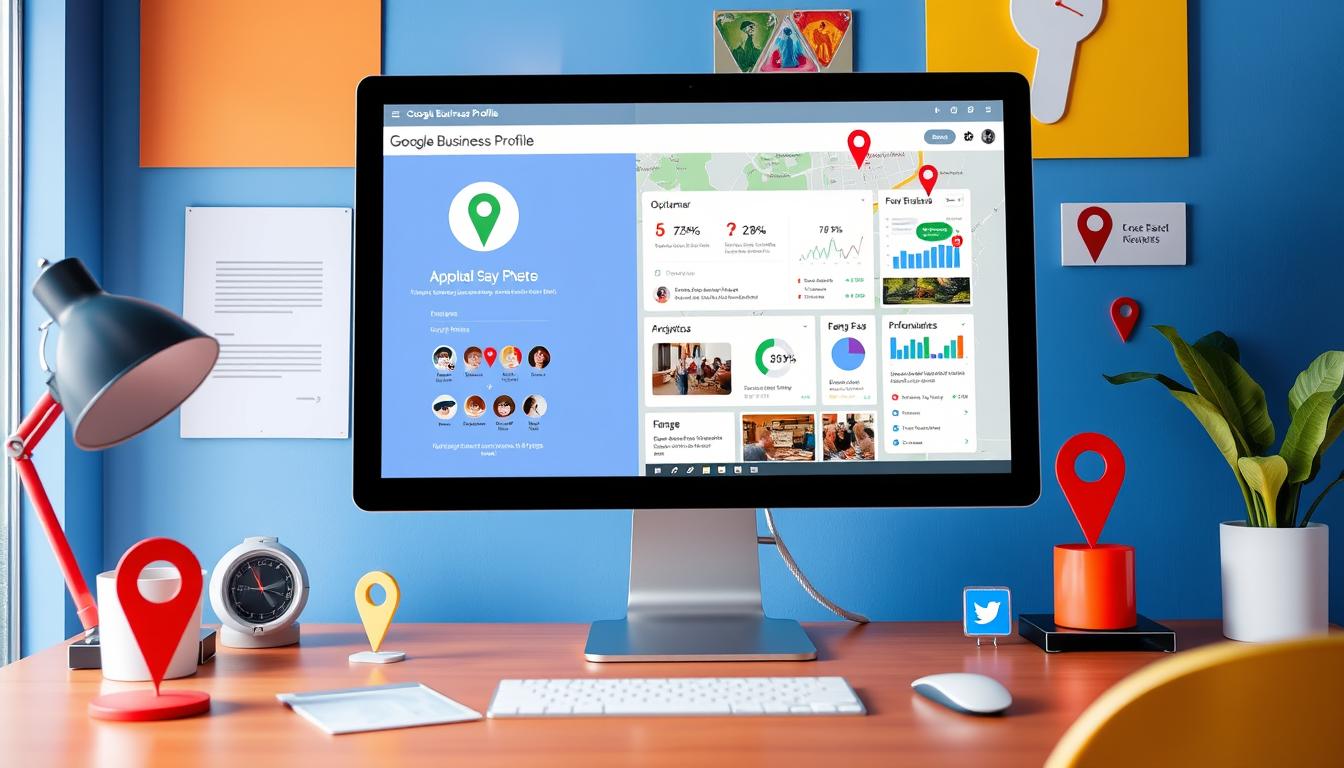
Local SEO Checklist: 10 Steps to Dominate Local Search
As a business owner, you know how vital a strong online presence is. With over 46% of searches having local intent, focusing on local SEO is key. A detailed local SEO checklist can boost your local search rankings and draw in more customers. This article will give you a full local SEO checklist, covering vital steps like claiming your Google Business Profile and using local keywords.
To boost your local search rankings, focus on key local SEO factors. A local SEO checklist ensures your business is seen by more customers, leading to more sales. Our checklist will show you how to optimise your online presence, from making your website mobile-friendly to building quality local citations.
Key Takeaways
- Optimising for local search is vital for businesses to succeed in the competitive market.
- A local SEO checklist can enhance your local search rankings and attract more customers.
- Claiming and optimising your Google Business Profile is a key step in local SEO.
- Using local keywords wisely can improve your local search rankings.
- Regularly checking your local SEO performance helps track important metrics and make informed decisions.
- Positive online reviews are key to building trust with customers and boosting local search rankings.
- A well-structured local SEO checklist can help you dominate local search and enhance your local SEO ranking factors.
1. Claim and Optimise Your Google Business Profile
As a business owner in the UK, you know how vital a strong online presence is. Claiming and optimising your Google Business Profile is a key step. It shows your business’s hours, address, and contact details, helping customers find you.
Optimising your Google Business Profile boosts your local SEO and search visibility. Google uses your profile’s info to rank your business in local searches. Make sure your business info is up-to-date, including address, phone number, category, and attributes.
Having accurate business info in your Google Business Profile is key for local SEO. Verified locations appear more in local search results on Google products like Maps and Search. Also, responding to reviews and adding photos can draw in more customers. Follow these tips to enhance your Google Business Profile and local SEO, making it easier for customers to find you.
Why Your Google Business Profile Matters for Local SEO
Your Google Business Profile is a powerful tool for local businesses. It connects customers directly to your business. With 46% of Google searches having local intent, a complete profile is vital for visibility.
2. Ensure NAP Consistency Across Platforms
When you’re working on your local SEO, it’s key to keep your business’s name, address, and phone number (NAP) the same everywhere. This is important for local SEO because it helps search engines know your business is real. Keeping your NAP the same helps build trust with customers and can boost your local search rankings.
Recent studies show that having the same NAP details everywhere is vital for SEO. Any differences can hurt your search rankings. By keeping your NAP the same, you can get better local search rankings and avoid penalties.
What is NAP Consistency and Why It’s Crucial?
NAP consistency means your business’s name, address, and phone number are the same online. This includes your website, social media, and local directories. It’s key for local SEO because it helps search engines like Google know your business info is correct. By keeping your NAP the same, you can get better local search rankings and be more visible online.
Best Tools to Audit and Standardise NAP
There are many tools to help you check and standardise your NAP data. These include local SEO tools and citation management software. They help spot any NAP differences and make managing your online presence easier. Using these tools ensures your NAP is the same everywhere, which can improve your local SEO and online visibility. This is also where local SEO and citations play a role, helping you build a strong online presence and better search engine rankings.
3. Use Local Keywords Strategically
Using the right keywords is key for local SEO. You must know what your local audience searches for. This way, you can show up more in local search results.
Recent data shows 46% of Google searches are for local info. This includes products and services. So, adding local keywords to your content is vital.
A good local keywords strategy can boost your local SEO. By doing thorough keyword research, you find the best keywords for your business. This lets you optimise your website and online presence for your target audience’s searches.
How to Research Local Keywords Effectively
To find local keywords well, think about your business’s location and what you offer. Use online tools to find keywords your audience uses. This helps you add the right keywords to your content, improving your local SEO and visibility.
4. Build High-Quality Local Citations
Building high-quality local citations is key to better local SEO. Citations help search engines see if your business is real. They boost your local search rankings and make you more visible online. This is vital, as over 46% of searches are local.
To create great local citations, make sure your NAP details (Name, Address, Phone Number) are the same everywhere. Tools like BrightLocal help with this. They check your rankings and make sure your business info is right.
Choosing the right directories for your business is important. Look for ones that fit your industry and location. By fixing any mistakes and getting listed in top directories, you’ll get more seen and boost your local SEO.
Importance of Citations for Local SEO
Citations are vital for local SEO. They show search engines your business’s online presence. With good citations, you’re more likely to rank higher in local searches. This brings more visitors to your site and boosts your online presence.
Top Directories for Building Local Citations
Google My Business and Bing Places are top choices for local citations. Also, look at industry-specific directories. Listing your business here improves your local SEO and online visibility. Always keep your NAP details the same to avoid SEO problems.
5. Generate and Manage Customer Reviews
As a business owner, you know how vital customer reviews are for SEO. Positive reviews help build trust and boost your local search rankings. In fact, 75% of people always or regularly check online reviews when looking for local businesses.
To get more positive feedback, ask your customers to review your Google Business Profile or other platforms. It’s also key to respond to reviews. This shows you value their opinions and care about their experience. It can make them more loyal and help your local SEO rankings.
Search engines like businesses with lots of positive reviews. By managing reviews, you can improve your online image and get more people to visit your business. Local SEO is a smart way to market yourself without spending a lot on ads.
Why Reviews are Critical for Local SEO
Customer reviews are key for local SEO as they offer proof and sway people’s choices. A good local SEO plan that includes reviews can make your brand more visible. It also leads to more engagement and foot traffic for businesses with physical locations.
6. Create Mobile-Friendly Website Pages
Improving your local SEO means focusing on mobile devices. Most local searches happen on phones. So, making your website mobile-friendly is key. It boosts your online presence and customer interaction.
Mobile devices now account for 48.8% of UK website traffic. Google now prioritises mobile-first indexing. A mobile-friendly site improves your search rankings and user experience.
Investing in mobile optimisation keeps you competitive. A mobile-friendly site is now essential for local businesses. It boosts your website’s visibility and drives more traffic.
Mobile Optimisation: A Must for Local SEO
Use Google Search Console to check your website’s mobile performance. It helps you find and fix issues. This ensures a better user experience and higher search rankings.
7. Implement Local Business Schema Markup
Optimising your website for local SEO is key. Schema markup plays a big role in this. It’s a microdata that helps search engines like Google understand your content better. This leads to more informative search results.
By adding local business schema markup, you can boost your local search rankings. This makes your business more visible online.
Recent data shows that one-third of searches are location-specific. This highlights the need for local SEO. Schema markup helps by giving search engines accurate info about your business. This includes your name, address, phone number, and hours.
This info is vital for local SEO success. It helps search engines understand your website better. It also gives customers the info they need to make choices.
There are different schema markup types for local businesses. You can use schema for reviews, events, and business hours. Adding these to your website gives search engines a better understanding of your business.
This can improve your local search rankings. With 97% of people learning about local companies online, a strong online presence is key. Schema markup helps you achieve this.
What is Schema Markup and How it Helps Local SEO
Schema markup helps search engines understand your content. This leads to more informative search results. By using schema markup, you can boost your local search rankings and make your business more visible.
Types of Schema to Use for Local Businesses
There are many schema markup types for local businesses. You can use schema for reviews, events, and business hours. Adding these to your website gives search engines a better understanding of your business.
This can improve your local search rankings. Some common schema markup types for local businesses include local business schema markup, schema for reviews, and schema for events.
8. Develop Location-Specific Landing Pages
Creating landing pages for specific locations is key for local SEO. It helps search engines see how your content relates to certain places. This makes your local search rankings better and gives your audience more relevant content.
For businesses with many locations, these pages are a must. They let you target specific areas and offer content that’s unique to each place.
The Moz’s State of Local SEO Industry Report 2020 shows what matters most for local search rankings. Google My Business, Google reviews, and how close you are to the business are top factors. Location landing pages can help you rank better by focusing on specific search terms.
Adding unique content to each location page can also boost your SEO and user experience.
When making location-specific landing pages, use location-specific keywords in your content and meta tags. This tells search engines your page is about a certain place. Also, use high-quality images to show the unique feel of each location. This helps connect with the local community.
Optimising your location-specific landing pages can make your website more visible online. This can lead to more website traffic and better local SEO performance.
Remember, location-specific landing pages are a big part of a good local SEO plan. By focusing on these pages, you can improve your online presence and get more sales and leads. With the right strategy, you can succeed more in the online market.
9. Leverage Online Mapping Platforms
As a business owner, you know how vital it is to be seen online, mainly for local searches. Online mapping platforms like Google Maps are key in helping people find your business. By using these tools, you can boost your online presence and draw in more customers. Local SEO is vital for businesses aiming to reach people in a specific area.
Optimising your business on Google Maps is a smart first step. This means setting up a Google My Business listing and keeping your details current. You can also use these platforms to get directions, see photos, and read reviews. This helps improve your local search rankings and makes it simpler for customers to locate you. For example,
Setting up Bing Places is another strategy for better local SEO. You need to claim and verify your business listing and ensure your details match everywhere online. This boosts your online visibility and attracts more customers. Remember, keeping your business info consistent is critical for local SEO success, across all platforms like Google Maps and online mapping tools.
Optimising Your Business for Google Maps
To optimise your business on Google Maps, make sure your Google My Business listing is complete and accurate. Include your business hours, description, and categories, and always respond to customer reviews. You can also use Google Maps to get directions and see photos of your business. This helps improve your local search rankings and makes it easier for customers to find you.
Setting Up Bing Places for Local SEO Success
Setting up Bing Places is another way to enhance your local SEO. This involves claiming and verifying your business listing and ensuring your details are consistent everywhere online. By doing this, you increase your online visibility and attract more customers. Always keep your business information up-to-date and accurate across all platforms, including Google Maps and online mapping tools.
10. Track and Improve Local SEO Performance
To make sure your local SEO is working well, it’s key to track and keep improving your local SEO performance. Use tools like Google Analytics and Google Search Console to watch important stats. Look at organic traffic, keyword rankings, and how many people are converting.
Then, use this data to spot where you can get better. Make smart choices to tweak your local SEO plan.
Also, do local SEO audits often. Fix any tech problems like broken links or slow sites that might stop people finding you. Keep up with new local SEO tips and change your methods as search engines update.
By carefully tracking and boosting your local SEO, you’ll draw in more targeted, high-intent customers. This will make your business a go-to local spot and help it grow steadily.
FAQs
Your Google Business Profile is key for sharing your business info. It includes hours, address, and contact details. Making it better is key for local SEO. It boosts your visibility in local searches and gives customers what they need.
Keeping your business's name, address, and phone number (NAP) the same online is critical. Different NAPs can harm your SEO. It makes it tough for search engines to show your business info correctly.
Using local keywords in your content is vital for local SEO. Find and use relevant local keywords in your website. Also, track how these keywords perform to better your local search rankings.
Getting your business mentioned on other websites is key for local SEO. Quality citations boost your local search rankings and visibility. This helps attract more customers.
Customer reviews are vital for local SEO. Good reviews can lift your rankings and build trust. Encourage reviews and respond to them well.
With more mobile searches, making your website mobile-friendly is essential. Test your site on mobile, improve it if needed, and ensure a smooth user experience.
Schema markup helps search engines understand your website better. It's key for local SEO. It can improve your rankings and give users more detailed search results.
Creating landing pages for each location is vital for local SEO. Optimize these pages with local content and keywords. This boosts your visibility in local searches and offers a better user experience.
Platforms like Google Maps and Bing Places are key for local SEO. Optimise your listings, keep your info current, and use them to boost your visibility and attract local customers.
Keeping an eye on your local SEO performance is essential. Use tools to track metrics like visibility, traffic, and conversions. This helps you spot areas for improvement and enhance your SEO strategy over time.










